- Home
- David Downing
One Man's Flag
One Man's Flag Read online
Books by David Downing
The John Russell series
Zoo Station
Silesian Station
Stettin Station
Potsdam Station
Lehrter Station
Masaryk Station
The Jack McColl series
Jack of Spies
Other titles
The Red Eagles
Copyright © 2015 by David Downing
All rights reserved.
Published in the United States by
Soho Press, Inc.
853 Broadway
New York, NY 10003
Library of Congress Cataloging-in-Publication Data
Downing, David, 1946–
One man’s flag / David Downing.
(A Jack McColl novel ; 2)
1. Intelligence officers—Great Britain—Fiction. 2. Women journalists—Great
Britain—Fiction. 3. World War, 1914-1918—Ireland—Fiction.
4. Ireland—History—1910-1921—Fiction. I. Title.
PR6054.O868O54 2015
823’.914—dc23 2015014946
ISBN 978-1-61695-270-9
eISBN 978-1-61695-271-6
Interior design by Janine Agro, Soho Press, Inc.
Printed in the United States of America
10 9 8 7 6 5 4 3 2 1
This book is dedicated to my grandfather,
Gerald Percy Constantine,
who served in India during the Great War
and many years later introduced me
to the joy of making up stories.
If you insist upon fighting to protect me, or “our” country, let it be understood, soberly and rationally between us, that . . . as a woman, I have no country. As a woman I want no country. As a woman my country is the whole world.
—Virginia Woolf
Historical Note
The Britain that went to war in 1914 was more than an island state on the edge of Europe. The British Empire also included largely self-governing dominions, colonies ruled by London’s appointees, and, in the case of Ireland, another island nation long subsumed by its larger neighbor.
When war broke out, the white-settler-ruled dominions—Canada, Australia, New Zealand, and South Africa—took it for granted that Britain’s fight was theirs and sent soldiers across the world to play their part in the motherland’s struggle. But it was different for those living under direct British rule, who were given less choice in the matter and who had less stake in the outcome. In many such places—India and Ireland foremost among them—resentment of British rule was already growing at a rapid pace, and those demanding greater autonomy were bound to see the empire’s moment of peril as their moment of opportunity.
In India the movement for self-rule was led by the Congress Party, most of whose leaders, including Mohandas Gandhi, were prepared to accepted the British argument that change would have to wait until after the war. But there were also powerful groups in both Punjab and Bengal that refused to wait and instead set about mounting campaigns of violence against British rule.
The situation in Ireland was similar. The long campaign for Home Rule—a roughly analogous status to that enjoyed by the white dominions—had finally been won in 1914, only to be postponed when war broke out. This was accepted by many but failed to satisfy those demanding full independence. And here, as in India, there were many who believed that the wait had already been too long.
As always, an enemy’s enemy might prove a useful friend. Even before the war, both Irish and Indian groups had reached out to the Germans, and once the fighting was under way, these contacts were pursued with increasing vigor.
A German Who Could Pass
for an Englishman
High on Darjeeling’s Observatory Hill, Jack McColl stared out at the snow-draped Himalayas. The view was as magnificent as everyone in Calcutta had told him it would be, so he sat there on the British-manufactured wrought-iron bench and tried to take it in. And all he could see was the glow in Caitlin Hanley’s eyes as their train snaked through the snow-clad Rockies.
A year had passed since then. Eight months since the day she’d stormed out of his London flat, leaving him feeling like the ultimate fool.
Eight months of war and worrying about his brother. Eight months of waiting for Caitlin’s brother to meet his executioners. Eight months of wishing he hadn’t betrayed her.
He sighed and looked at his watch. It was time he went to arrange his meeting with the German internee.
When war broke out the previous August, Jürgen Rehmer had been a high-ranking employee of the North German Lloyd shipping company, with a plush office on Calcutta’s Dalhousie Square, a beautiful villa overlooking the Maidan, and many close friends among the British community. Then the news of hostilities had reached India and armed police had appeared at his door. Within a matter of hours, he and his wife were on their way to the hastily established internment camp at Katapahar, a few miles south of Darjeeling. They’d been there ever since.
McColl took the path back to Chaurasta Square, making sure to scan the bushes on either side. He wasn’t expecting an attack, but such caution had become second nature in Calcutta after so many terrorist incidents. Darjeeling was probably safe, although these days you never knew, and he no longer went anywhere without his Webley revolver.
The police station was on Auckland Road, not far below the square. He was escorted through to the local commissioner’s office, where a fellow Scot named Gilzean was already waiting for him. A strong whiff of whiskey accompanied the handshake.
McColl took the proffered seat and looked around. The office was almost as sparse as his hotel room. A map of the district adorned one wall, but the others were bare, and the highly polished desk boasted only a single pen, a wooden tray containing a small sheaf of papers, and a framed photograph of several men standing over a dead tiger.
“The camp’s about five miles south of here,” Gilzean told him. “I assume you’ll be wanting to see your man tomorrow morning?”
“That sounds good. How do I get there?”
“I’ll have one of our chaps take you down in a tonga. We try not to use our automobile unless we have to—the roads are a nightmare. He’ll pick you up at nine, all right? And I’ll telephone the camp and let them know you’re coming.”
“Have you met Rehmer?”
“Aye, once. A decent chap for a Hun, but then I suppose most of them are. It’s a pity the ones that aren’t seem to be in charge.”
“Yes.” Since there seemed nothing more to say, McColl got back to his feet.
Gilzean wasn’t done. “So what do you want with the man?” he asked.
There was no obvious reason not to tell him. “Some information about someone else. Back in August, when he was questioned in Calcutta, he mentioned a name that has come up several times in connection with gunrunning. He was questioned again in January—”
“I know. He refused to say anything. What makes you think he’ll change his mind?”
“His wife’s ill.”
“Ah.” Gilzean’s initial reaction was a look of disgust, but he managed to shrug it away. “We are at war,” he said, as much to himself as McColl.
“We are indeed,” McColl agreed. And where would they be without that comforting mantra? he wondered, walking back up the hill toward his hotel. To his ears at least, it sounded a tad more hollow with each passing Indian day.
When he woke up the following morning, the mountains had disappeared behind a curtain of mist. Over breakfast he went over what he knew about Rehmer, which wasn’t very much.
The German had been good at his job, an affable dinner guest, better than average on the polo field. Two British neighbors had spoken out against his arrest but had quickly withdrawn their protests when news of the German behavior in Belgium had reached Calcutta. With a British victory now clearly essential at any price, locking up a few relative innocents for a few months seemed a small one to pay. There were those like McColl’s recently acquired friend Cynthia Malone who argued that there seemed little point fighting the Hun if you sank to his level, but such dissenting voices were few and far between. McColl had had no pat answer for them, other than a vague but strong sense that a victory for German militarism would be worse for the world than would a victory for Germany’s opponents. And there was always the highly salient fact that the Germans were actively seeking to kill his brother, Jed, his old friend “Mac” McAllister, and their several hundred thousand comrades manning the trenches in France.
Which was why he was doing unpleasant jobs like this one, McColl reminded himself. Sometimes that seemed reason enough. Sometimes it didn’t.
Emerging from the hotel entrance at nine o’clock, he found his transport ready and waiting. The driver, a young Bengali policeman, introduced himself as Salil and the pony as Kipling.
“And how are you discovering Darjeeling?” the Indian asked in English once the tonga was moving.
“I like it,” McColl answered, although as yet he’d seen precious little of the town. After leaving Gilzean the previous afternoon, he’d considered dining at the Darjeeling Club—the Calcutta Department of Criminal Intelligence chief had promised to get his name put down as a guest—but knowing the sort of people he’d encounter and what range of opinions would be slid, tipped, or shoved down his throat, he’d decided to eat at his hotel instead. After that he’d retired to his room and read a few more chapters of The Ragged-Trousered Philanthropists, the new novel that Cynthia had insisted on lending him.
“Were you born here?” he asked Salil.
“No, sahib. In Calcutta.”
“You prefer it here.”
Salil shook his head. “When the sun shines, Darjeeling is a fine town. But in the rain and the cold . . .” He shivered at the thought. “And my wife and son are in Calcutta,” he added.
Road and railway ran south in tandem, crossing each other at regular intervals as they climbed toward Ghoom. Densely wooded hillsides receded into the mist, and, hearing chanting in the distance, McColl thought he could see the blurred outlines of a monastery hanging above the valley. In Ghoom they turned east down a gently winding road through tea plantations before arriving at their destination, a cluster of wooden buildings on a partially cleared, east-facing slope. Although two sepoys guarded the gate, the fences on either side looked eminently scalable. But then where would an escapee run to? The remoteness of the camp’s location was enough of a deterrent.
The internees were housed in two barracks, one for the men, one for the women and children. Many of the latter were playing outside, apparently enjoying themselves, but McColl found it hard to imagine how the adults filled their days in a place like this, particularly since none of them knew when if ever they would be released.
One of several wooden cabins housed the administration, and the man in charge—a Yorkshireman named Marshall—was waiting for him on the veranda. The man shook hands but seemed disinclined to conversation. “You can use my office inside,” he told McColl, and without waiting for assent ordered a loitering subordinate to “bring Rehmer up here.” Two minutes later McColl was alone with the German.
Jürgen Rehmer looked all of his fifty-four years, with a face badly worn by life in the tropics. He was about six feet tall, with cropped gray hair, blue eyes, and regular features. He was, as the saying went, one of those Germans who could pass for an Englishman. McColl found himself idly wondering whether the Germans had the contrary saying.
Speaking German, McColl asked Rehmer how he was.
As well as could be expected, was the gist of the answer.
“And your wife?”
“She is unwell.”
“I heard that she was and am sorry to hear she still is. But perhaps I can help in that regard.”
Rehmer’s look was both hopeful and suspicious. “You will have to explain that.”
McColl sighed. “I won’t insult you with pretense. I’m here to offer you a deal—you tell me everything you know about Franz Kopping and you and your wife will go free. I will personally escort you both to Calcutta, and once she has received the medical treatment she needs, I’ll put you both on a boat to some neutral port. Batavia, I expect. From there you can go where you want.”
Rehmer shifted slightly in his chair and gave McColl a long, cold stare. “Let us be clear,” he said eventually. “You are asking me to choose between my wife and my country.”
“Yes,” McColl agreed. If their positions had been reversed, he knew which he’d have chosen, but a man like Rehmer probably loved them both with a similar kind of passion.
“And you consider such a proposition honorable?”
“I’ve had jobs I enjoyed more,” McColl admitted wryly.
“But you’re just following orders?”
“Something like that.”
Rehmer shook his head. “My inclination is to tell you to go to hell. But I’m not the only one involved. I shall have to discuss this with my wife.”
McColl nodded his agreement. If he was going to play this sordid game, he might as well play it to win, and giving Rehmer a decent stretch of time to dwell on the future loss of his wife might possibly do the trick. “I’ll be back in two days,” he told the German.
Once Rehmer had been led away, McColl asked Marshall how ill the wife was.
“Hard to say,” was the answer, “but I think she’ll last long enough for your purposes.”
McColl ignored the gibe. “What does she need in the way of medicines?” he asked.
“She doesn’t, according to our doctor. She just needs a drier climate.”
On the ride back to Darjeeling, McColl was less than responsive to Salil’s cheerful chatter, and the sepoy eventually retreated into a hurt silence. After reporting the gist of his conversation with Rehmer to Gilzean, McColl walked up Auckland Road to the club, received the promised guest membership, and ate a large though unimaginative lunch. Several members introduced themselves, but taciturnity bordering on rudeness won him the solitude he wanted. Doubtless they all knew why he was here—Darjeeling in winter was a small community by Raj standards—and he had no desire to discuss his business, or indeed anything else, with any of them.
After eating he sequestered himself in the library, where a fortnight-old copy of The Times painted a glowing account of the recent British offensive near Neuve-Chapelle. Actually, as McColl knew from friends in Calcutta, the attack had been a disaster, with a quarter of the forty thousand troops involved either killed or wounded. Since almost half of those casualties had come from the Indian Corps, London had lost no time in passing the bad news on to Delhi. There was quite enough disaffection already, and losses like this would only cause more. McColl thought it unlikely that the recent passage of a new Defence of India Act—one that gave the Raj authorities increasing powers of arrest and detention—was wholly coincidental.
Outside, it was still overcast, but he revisited Observatory Hill anyway, seating himself on the thoughtfully placed bench and staring out at the sea of mist that shrouded the valley and mountains. He didn’t like this task he’d been given. He didn’t much like being in India, so far away from the war’s epicenter, but he was the only Urdu speaker the Secret Service Bureau possessed, and he did have experience dealing with Indian revolutionaries, albeit in San Francisco rather than India. The Ghadar organization he’d investigated in early 1914 had finally brought their revolt home to the Punjab a few weeks earlier, but it had swiftly fizzled out, largely thanks to the work of an Indian inf
iltrator. McColl had been mentally packing his bags when his boss, Mansfield Cumming, had decided that the escalating terrorist campaign on the other side of India required his attention.
Perhaps it did, but McColl was far from convinced. In Bengal a series of robberies and assassinations sponsored by the Jugantar terrorist group had brought the authorities close to panic, and by the time McColl reached Calcutta, the India Department of Criminal Intelligence, the local police, the India Office, and Vernon Kell’s Military Intelligence Section Five had all been enlisted as part of London’s response. There was, he soon found out, no shared agenda or accepted chain of command. As McColl had come to expect when intelligence agencies fished in the same stretch of river, each outfit was devoting as much time and effort to stealing its rivals’ rods as it was to catching fish.
The newly assertive Jugantar was well organized and effective, its leader Jatin Mukherjee good at choosing and hitting his targets and adept at foiling British attempts to locate and arrest him. People were dying, the British looking increasingly helpless, but as far as McColl could see, there was no chance of Jugantar’s actually winning. Robbing a store in Roddha the previous August had netted the group fifty Mauser pistols, but all the intelligence pointed to these as the only guns it possessed. No, Jugantar was certainly an annoyance, and rather more than that to those it killed, but it didn’t have the weaponry to mount a serious challenge, not on its own.
German help would be necessary, and there had been rumors—even plausible ones—that some contact had been made. And with their support for Ghadar, the Germans had demonstrated a definite interest in helping any Indian group that might cause the British sufficient trouble in the subcontinent to make them think twice about sending more troops to Europe.
One of these rumors had involved a businessman named Franz Kopping, and a subsequent investigation by the Singapore authorities had uncovered a past association with Jürgen Rehmer. Questioned the previous September, Rehmer had denied more than a passing acquaintance and claimed he knew nothing about German intelligence in Asia or arms shipments to India. Since then he’d been left to enjoy his captivity in peace, until some bright spark in the DCI office in Calcutta had picked up the news that Rehmer’s wife was seriously ill.

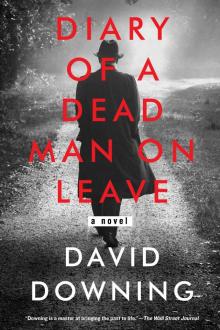 Diary of a Dead Man on Leave
Diary of a Dead Man on Leave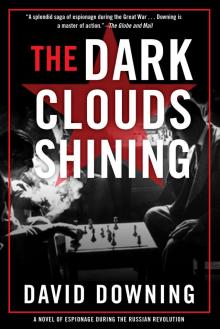 The Dark Clouds Shining
The Dark Clouds Shining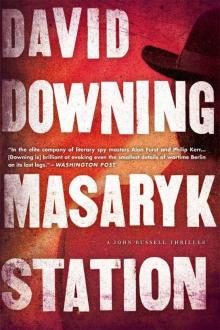 Masaryk Station (John Russell)
Masaryk Station (John Russell) Zoo Stationee
Zoo Stationee Zoo Station jr-1
Zoo Station jr-1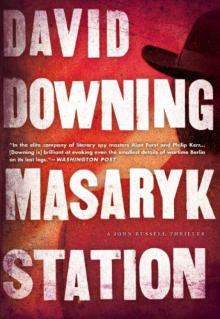 Masaryk Station
Masaryk Station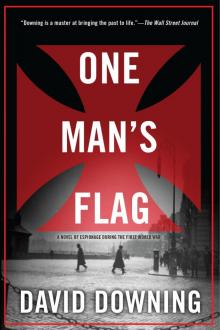 One Man's Flag
One Man's Flag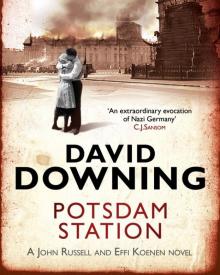 Potsdam Station jr-4
Potsdam Station jr-4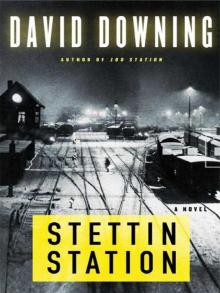 Stattin Station jr-3
Stattin Station jr-3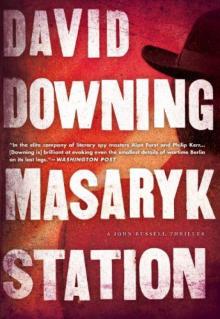 Masaryk Station jr-6
Masaryk Station jr-6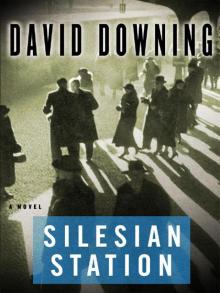 Silesian Station (2008) jr-2
Silesian Station (2008) jr-2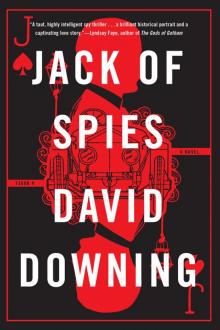 Jack of Spies
Jack of Spies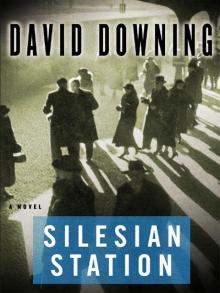 Silesian Station (2008)
Silesian Station (2008) The Moscow Option
The Moscow Option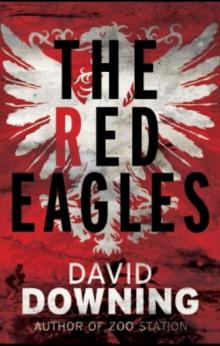 The Red Eagles
The Red Eagles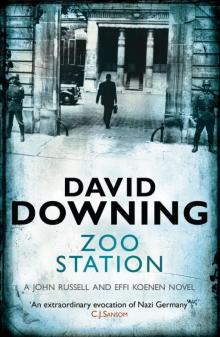 Zoo Station
Zoo Station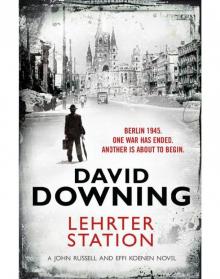 Lehrter Station
Lehrter Station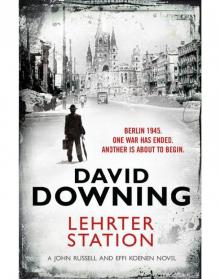 Lehrter Station jr-5
Lehrter Station jr-5